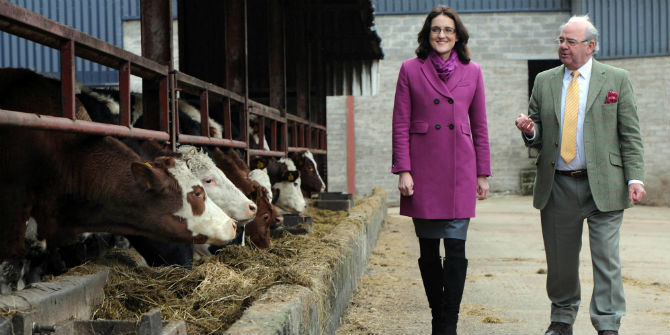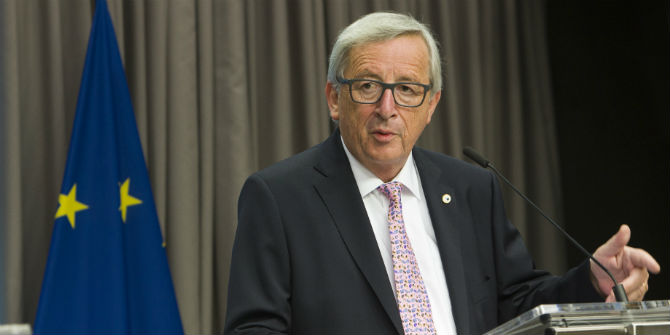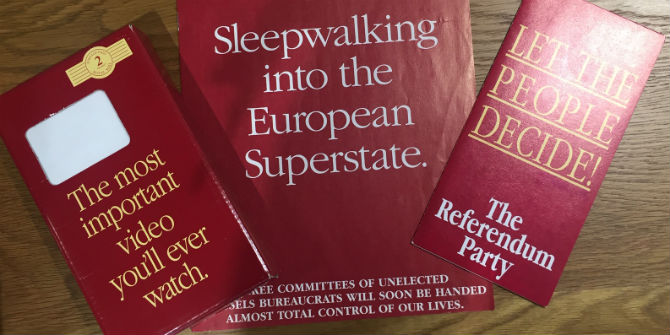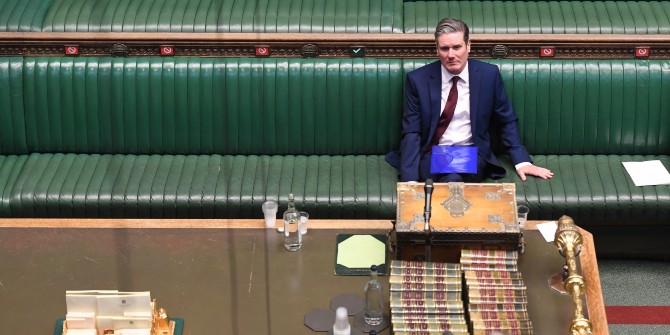 The government has paid dearly for the support of the Democratic Unionist Party. Anthony Costello looks at what Northern Ireland will get in exchange for propping up the Conservatives. The irony is that £1bn in extra public spending is unlikely to compensate for the effects of Brexit on a region which is heavily dependent on agriculture and which has benefited greatly from EU funds.
The government has paid dearly for the support of the Democratic Unionist Party. Anthony Costello looks at what Northern Ireland will get in exchange for propping up the Conservatives. The irony is that £1bn in extra public spending is unlikely to compensate for the effects of Brexit on a region which is heavily dependent on agriculture and which has benefited greatly from EU funds.
The dowry the Conservative party brought to its union with the Democratic Unionist Party was exceptionally generous, totalling £1bn. Some, including myself, have wondered whether this partnership could be a positive force, somewhat perversely paving the way for a soft/softer Brexit – whatever that might mean in practice. But a closer reading of the document offers little to suggest that the DUP can soften Theresa May’s stance.
A firm majority – 55.8% – of the Northern Irish electorate voted to Remain within the EU, with the results crossing sectarian lines. The result indicates that Northern Irish interests are paramount to the electorate, and these interests are best served through the UK’s continued membership of the EU. Access to the Single Market, as well as EU structural funds (such as the Common Agricultural Policy) and the EU’s PEACE and INTEREG funds have served the region well on its path to democratisation and autonomy.

Nationalist communities offered overwhelming support for the Remain camp. UK membership of the EU facilitated the Northern Irish peace process and the establishment of the Good Friday Agreement and has brought the nationalist communities economically, politically, socially and culturally closer to their southern counterparts in the Republic. Severance of UK membership of the EU, as well as the potential for a hard Brexit has led to much concern about the future economic and political stability of Northern Ireland – a region much less economically viable than some of its regional counterparts in Britain. The reinstatement of the border between Northern and the Republic of Ireland will have significant consequences for Northern Irish border county trade and employment.
For some, the £1bn deal has provided a very welcome injection of cash into the Northern Irish economy and boosted economic confidence amongst the electorate. For others, it represents a short-term pay-off which subjugates any potential that Northern Ireland had to influence the Brexit negotiations. Some regard the deal positively as a force for Unionist empowerment in the North. Many others fear that such political leverage will negatively affect the democratic quality of governance in the region. Most contentious is the issue of impartiality in the Good Friday Agreement. Conservative ‘union-ship’ with the DUP has put to the question whether the UK government has violated the terms of impartiality, and if so, how detrimental to the Northern Irish peace process this arrangement may be.
The DUP alliance does have the potential to lead the way to a softer Brexit, providing that pragmatism – as opposed to ideology – determines the party’s Brexit-based goals, mediated through its new-found influence. However, knowing what we know about the DUP as an ideological force combined with their intense loyalty to the concept of a sovereign United Kingdom – as well as their Eurosceptic sentiments – the sheer financial value of the deal should lead us to ask some pressing questions.
Most of the terms of the agreement are typical of ‘confidence and supply’ deals. The DUP has promised to abstain on motions of no confidence and on finance, budget and general money bills, as well as some mutual agreements on matters such as the pensions triple lock, winter fuel payments and NATO. However, the striking aspects of the document pertain to the language surrounding the DUP’s support regarding Brexit negotiations, as well as the Conservative Party’s support for Northern Ireland’s agricultural sector. For example, the DUP commits to ‘‘support the government on legislation pertaining to the United Kingdom’s exit from the EU’’ and ‘‘legislation pertaining to national security’’. Although vague, this suggests that the Conservative party will remain the true drivers of the Brexit negotiations and the values of the Conservative party regarding the issue will be supported by their partners.
Another striking feature of the agreement are references to Northern Ireland’s agricultural industry. ‘‘Agriculture will be a critical policy area during the EU exit negotiations’’ – and the Conservative party will provide a framework for future farming support after the end of the parliament. There is potential for a soft (or softer) Brexit if the Conservatives take into account the unique conditions of Northern Ireland’s agricultural sector in EU talks. A hard Brexit will probably mean the introduction of trade tariffs, as well as the loss of essential CAP funding. That could affect prices, production levels and employment rates. It is not clear if the UK would step in so as to drive down price inflation and stabilise production. However, if it does, taxes will have to rise as a result.
The Irish Republic is Northern Ireland’s main export partner in the agri-food sector. Inflation, tariffs and a loss of funding will affect cross-border trade (particularly in the border counties), as it could become too costly to trade with Northern Ireland outside the Single Market or customs union. Without this trade with the South the prospects for Northern Ireland’s economy look bleak.
Promises to help agriculture, as well as the pledges to boost health funding (including mental health) and the services sector are effectively insurance policies against economic crisis. They may be a stop-gap in lieu of EU funding, and indicative of a plan to protect the region against the effects of a hard Brexit.
The document did not even mention the matter of the Northern Irish border – yet it ought to be a crucial issue for Northern Ireland due to the economic, political and social factors at stake. Since it represents a solidifying inter-party relationship intended to re-establish the Conservative Party’s mandate for Brexit, one would expect more clarity on the issue. The blasé approach to leaving the EU is somewhat disconcerting.
Most alarmingly, the high price of the deal – an extortionate £1bn – is odd considering the Conservatives are gaining the support of just 13 extra MPs on general legislation, amid a few specific policy issues. Behind the deal’s vague assurances, it seems plausible that the DUP have pledged their support for a hard Brexit.
The irony is that £1bn will certainly not cover the long-term economic effects of a hard Brexit in the region. One can only hope that the payment will not serve to undermine Northern Ireland’s true interests in what will undoubtedly be long and tense negotiations.
This post represents the views of the author and not those of the Brexit blog, nor the LSE.
Dr Anthony Costello is a Lecturer in the Department of Government, University College Cork.







With respect to agriculture I believe you have misread the result of a”hard border”. The UK imports about 40billion of food stuffs from the EU every year. If tariffs were erected in a hard brexit scenario these would be the EU’s Common External Tariffs and these are the largest in the developed world. Dairy 30%, Pork 35%, Confectionary 30%, Beef 60% to 80%. The ESRI have done some analysis and they believe that trade in foodstuffs between the EU and the UK would fall by 90% in the case of the above tariffs being applied.
Seeing as there is then a 40billion gap to be filled in the UK market less our exports to the EU it would be boom time for NI farmers shipping food over the sea to the mainland.
The Irish agriculture sector and its representative groups have understood this fully and are requesting that the EU force the UK to stay in the customs union because otherwise the economic hit would be so great.